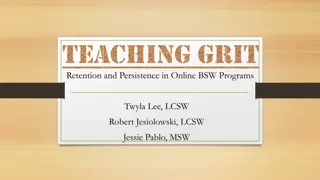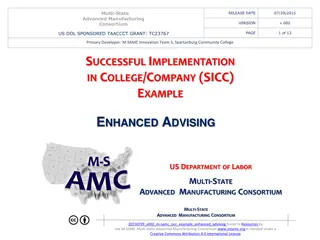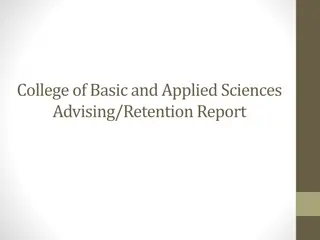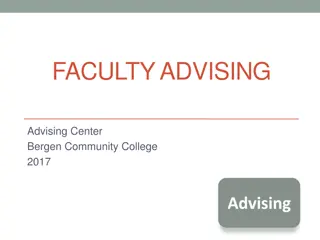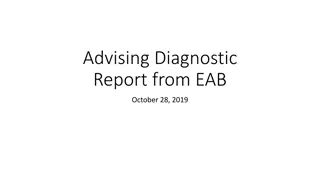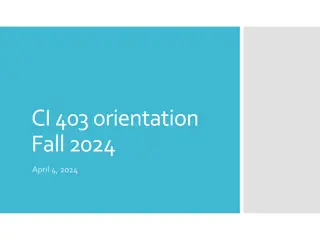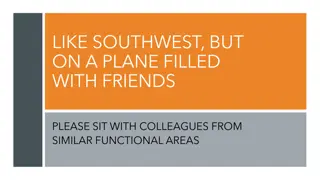
McGill School of Social Work BSW Program Overview
Learn about the McGill School of Social Work's Bachelor of Social Work (BSW) program, including curriculum details, credit requirements, residency mandates, and opportunities for external credits. Find out about advising, course structures, and regulations at McGill University for pursuing a BSW degree. Obtain insights into exceeding credit limits, grade requirements, and academic guidelines to successfully navigate your BSW journey.
Uploaded on | 0 Views
Download Presentation

Please find below an Image/Link to download the presentation.
The content on the website is provided AS IS for your information and personal use only. It may not be sold, licensed, or shared on other websites without obtaining consent from the author. If you encounter any issues during the download, it is possible that the publisher has removed the file from their server.
You are allowed to download the files provided on this website for personal or commercial use, subject to the condition that they are used lawfully. All files are the property of their respective owners.
The content on the website is provided AS IS for your information and personal use only. It may not be sold, licensed, or shared on other websites without obtaining consent from the author.
E N D
Presentation Transcript
1 McGill School of Social Work BSW Advising Julia Krane, PhD. & Maria Pacheco Julia Krane, PhD. & Maria Pacheco School of Social Work School of Social Work
2 BSW Curriculum BSW Curriculum Consists of 30 courses = 90 credits 21 courses are required SWRK courses = 63 credits 2 courses are complementary SWRK courses = 6 credits 5 courses are complementary = 15 credits Of these 5 courses (15 credits), 2 courses (6 credits) must be at 300 level or higher, or or 3 courses (9 credits) must be in the same discipline (NOT SWRK) See our Approved Social Sciences, Humanities, Interdisciplinary Prpgrams, Literature & Civilization courses on the BSW website: https://www.mcgill.ca/socialwork/prospective/bsw/formsmanuals 2 courses are electives = 6 credits (NOT SWRK)
3 Can I exceed 90 credits? Can I exceed 90 credits? Students are not permitted to exceed the 90 credits not permitted to exceed the 90 credits for the BSW Only with justification and the written approval of their academic advisor in the School of Social Work and and the approval of the Associate Dean, Faculty of Arts can students exceed the 90 credits for the BSW. https://www.mcgill.ca/oasis/files/oasis/exceeding_the_ba_degree.pdf See https://www.mcgill.ca/oasis/academic/degree-planning/requirements See https://www.mcgill.ca/oasis/academic/degree-planning-guide
4 Residency Requirements & Grade Requirements Residency Requirements & Grade Requirements Students must complete a minimum of 60 credits at McGill University toward the fulfilment of the BSW degree requirements At least two-thirds of all program requirements must normally be completed at McGill This means that students are permitted to take up to 30 credits towards the BSW degree external to McGill University (some restrictions and regulations apply) See: https://www.mcgill.ca/study/2018- 2019/faculties/arts/undergraduate/ug_arts_residency_reqs
5 Up to 30 credits External to McGill Up to 30 credits External to McGill All students are permitted to take up to 30 credits external to McGill towards the BSW program As a first step, students consult with their academic advisor for approval in terms of how any external course meets with the BSW program requirements If the course is offered in another university in the province of Qu bec. See: https://www.mcgill.ca/oasis/away/application-process/inter-university- transfer-iut-including-online If the course is external to the province of Qu bec. external to the province of Qu bec. See: https://www.mcgill.ca/oasis/away/plan-prepare Courses taken at another university must be assessed for course content McGill s Course Equivalency System. See: https://nimbus-ssl.mcgill.ca/exsa/search/searchEquivalency in the province of Qu bec. course content on
6 Required Courses: Required Courses: Required courses Required courses are mandatory courses that must be completed to fulfil the BSW program Students have no choices among required courses. It is possible to request an exemption from a required course The BSW program is comprised of 63 credits of required SWRK courses 63 credits of required SWRK courses
7 Complementary Courses: Complementary Courses: Complementary courses Complementary courses are selected from a restricted list from which students choose; the aim is to give students exposure to specialized areas of practice. The BSW program is comprised of 6 credits of complementary SWRK courses 6 credits of complementary SWRK courses The BSW program is also comprised of 15 complementary credits from Sciences, Humanities, Interdisciplinary Programs, Literature & Civilization Sciences, Humanities, Interdisciplinary Programs, Literature & Civilization NOTE: NOTE: Students must respect any restrictions or prerequisites listed in the university calendar. If instructor permission is required, students must follow up with the specific instructor in the particular department and go through their administrative office to get an override to register. Permission must be obtained prior to course registration. 15 complementary credits from Social Social *** see BSW Plan of Study section of website *** *** see BSW Plan of Study section of website ***
8 Elective Courses: Elective Courses: The BSW program is comprised of 2 elective courses = 6 elective credits Electives are Not SWRK Not SWRK courses Electives are courses taken for credit from any academic Faculty and any department Elective courses are 200+ level 200+ level The only exceptions to taking 200+ level courses as electives are: only exceptions to taking 200+ level courses as electives are: Math courses & FYI seminars Math courses & FYI seminars Language courses Language courses, where the appropriate level is determined by a placement test administered by the department offering the course 6 elective credits any academic Faculty and any department. See https://www.mcgill.ca/oasis/students/new/incoming-u1/course-selection *** see BSW Plan of Study section of website *** *** see BSW Plan of Study section of website ***
ONLY ELECTIVES can be taken ONLINE ONLY ELECTIVES can be taken ONLINE ONLY ELECTIVES can be taken as S/U ONLY ELECTIVES can be taken as S/U 9 ONLY ONLY elective courses can be taken online in our BSW program ONLY ONLY elective courses can be taken with the S/U grading option Required and complementary courses may not be taken online or graded as S/U A maximum maximum of 6 credits of elective courses can be taken online and/or graded with the S/U option towards the BSW program See https://www.mcgill.ca/study/2018- 2019/faculties/arts/undergraduate/ug_arts_course_reqs#booknode-67070 Tip: Tip: Students interested in the MSW might consider taking a statistics course as an elective or non an elective or non- -SWRK complementary course SWRK complementary course during their BSW or prior undergraduate studies. statistics course as
10 Complementary Courses: Not SWRK Complementary Courses: Not SWRK 15 credits from any Civilization and specified interdisciplinary programs (Not SWRK) anycourse from any any discipline in the Social Sciences, Humanities, Literature & Of these 15 credits, 9 credits must be from the SAME discipline OR 6 credits must be at the 300+ level SOCIAL SCIENCES: SOCIAL SCIENCES: Anthropology (ANTH) Linguistics (LING) Economics (ECON) Political Science (POLI) Geography (GEOG) Psychology (PSYC) History (HIST) Sociology (SOCI) HUMANITIES: HUMANITIES: Art History & Communication Studies (ARTH) Music (MUAR) English (ENGL) Philosophy (PHIL) Gender, Sexuality, Feminist & Social Justice Studies (GSFS) Religious Studies (RELG) INTERDISCIPLINARY PROGRAMS: INTERDISCIPLINARY PROGRAMS: Canadian Studies (CANS) International Development Studies (INTD) Indigenous Studies (INDG) African Studies (AFRI) Latin American and Caribbean Studies (LACS) Gender, Sexuality, Feminist & Social Justice Studies (GSFS)
11 Complementary Courses: Not SWRK , continued Complementary Courses: Not SWRK , continued Same rules Same rules just a reminder: just a reminder: 15 credits from any specific interdisciplinary programs (Not SWRK) Of these 15 credits, 9 credits must be from the SAME discipline OR 6 credits must be at the 300-level or higher From the below list of Literature & Civilization programs and departments, students are permitted to select any course except ALL language courses except ALL language courses to fulfill the 15 complementary credits. ALL language courses CAN be taken as electives: as electives: any course from any any discipline in the Social Sciences, Humanities, Literature & Civilization and ALL language courses CAN be taken Literature & Civilization: Literature & Civilization: Classics (CLAS) Islamic Studies (ISLA) East Asian Studies (EAST) Italian Studies (ITAL) French Studies (FREN) Jewish Studies (JWST) Russian Studies (RUSS) German Studies (GERM) Hispanic Studies (HISP) Spanish Studies (HISP)
12 ELECTIVE COURSES, RESTRICTIONS & PREREQUISITES ELECTIVE COURSES, RESTRICTIONS & PREREQUISITES Same rules Same rules just a reminder: just a reminder: 200+ level with specific exceptions: Math; FY seminars; language courses Elective courses are taken for credit from any academic Faculty and any department any academic Faculty and any department Only electives can be taken online and only up to 6 credits online School of Continuing Studies courses do not count towards an Arts degree except: School of Continuing Studies courses do not count towards an Arts degree except: With subject numbers that do not start with a C (exception CHEM and certain McGill Writing Centre do not start with a C (exception CHEM and certain McGill Writing Centre courses that begin with CEAP or CESL courses that begin with CEAP or CESL see the see the eCalendar eCalendar) ) are accepted are accepted for credit towards your BSW Other acceptable Continuing Studies courses for credit as an elective CEAP 250 Research Essay & Rhetoric CESL 300 ESL: Academic English 2 CESL 400 ESL: Essay & Critical Thinking CESL 500 ESL: Research Essay and Rhetoric As well as CCOM 300: Writing and Community Action, offered by McGill Writing Centre as an elective include: See https://mcgill.ca/oasis/academic/courses/continuing-studies-courses for Continuing Studies courses that do not count for credit as electives. *** see BSW Plan of Study section of website *** *** see BSW Plan of Study section of website ***
13 Restrictions & prerequisites for Complementary Restrictions & prerequisites for Complementary and/or Elective courses (not SWRK) and/or Elective courses (not SWRK) Students must respect any restrictions or prerequisites listed in the university calendar for all SWRK and non-SWRK courses If instructor permission is required for complementary and elective courses (not SWRK), students must follow up with the specific instructor in the particular department and go through their instructor in the particular department and go through their administrative office to get an override to register administrative office to get an override to register. Permission must be obtained prior to course registration specific *** see BSW Plan of Study section of website *** *** see BSW Plan of Study section of website ***
14 Courses taken in U1 Courses taken in U1 Required social work courses (15 credits) Credits Credits SWRK 220 SWRK 220 History & Philosophy of SW (Fall) 3 SWRK 221 SWRK 221 Public Soc. Services in Canada (Fall) 3 SWRK 224 SWRK 224 Human Dev Across the Lifespan (Fall) *** *** 3 SWRK 222 SWRK 222 Introduction to Practicum (Winter) 3 SWRK 223 SWRK 223 Poverty and Inequality (Winter) 3 Complementary Social Sciences, Humanities, Interdisciplinary Programs, Literature & Civilization (Fall) 3 Complementary Social Sciences, Humanities, Interdisciplinary Programs, Literature & Civilization (Fall) 3 Complementary Social Sciences, Humanities, Interdisciplinary Programs, Literature & Civilization (Winter) 3 Complementary Social Sciences, Humanities, Interdisciplinary Programs, Literature & Civilization (Winter) 3 Complementary Social Sciences, Humanities, Interdisciplinary Programs, Literature & Civilization (Winter) 3 *** Eligible for an Exemption? *** Eligible for an Exemption?
15 Courses taken in U2 Courses taken in U2 Required social work courses (24 credits) Credits SWRK 320 SWRK 320 Practice with Individuals & Families 1 (Fall) 3 SWRK 321 SWRK 321 Introduction to Practice with Groups (Fall) 3 SWRK 322 SWRK 322 Field Practice 1 (Fall) 3 SWRK 325 SWRK 325 Anti-Oppression Social Work Practice (Fall) 3 SWRK 323 SWRK 323 Field Practice 2 (Winter) 3 SWRK 326 SWRK 326 Practice with Individuals & Families 2 (Winter) 3 SWRK 327 SWRK 327 Approaches to Community Practice (Winter) 3 3 SWRK 344 SWRK 344 Integrative Seminar I (Winter) Plus 6 complementary/elective credits Plus 6 complementary/elective credits
16 Courses taken in U3 Courses taken in U3 Required social work courses (24 credits) Required social work courses (24 credits) Credits Credits SWRK 420 SWRK 420 Advanced Field Practice 1 - Fall 3 SWRK 421 SWRK 421 Advanced Field Practice 2 - Winter 3 SWRK 423 SWRK 423 Social Work Research (Fall) *** *** 3 SWRK 424 SWRK 424 Mental Health and Illness (Fall) 3 SWRK 428 SWRK 428 Social Policy & Administration (Fall) 3 SWRK 422 SWRK 422 Integrative Seminar II (Winter) 3 3 SWRK 445 SWRK 445 First Peoples & Social Work (Winter) 3 SWRK 525 SWRK 525 Critical Thought & Ethics in Social Work (Winter) Plus 6 complementary/elective credits Plus 6 complementary/elective credits *** Eligible for an Exemption? *** Eligible for an Exemption?
Social work complementary courses: 2018 Social work complementary courses: 2018- -2019 *** 2019 *** 17 Second Year (U2) Second Year (U2) SWRK 342 SWRK 354 Practice with GLBT-S People Social Work in the Health Field Third Year (U3) Third Year (U3) SWRK 400 SWRK 434 SWRK 463 SWRK 493 SWRK 510 SWRK 532 SWRK 535 IDFC 500 *** *** Check the School of Social Work website and then check Minerva class schedule to see if the Check the School of Social Work website and then check Minerva class schedule to see if the course is offered; it almost always is! course is offered; it almost always is! Policy & Practice for Refugees Practice with Involuntary Clients Social Work Practice with Older Adults Seminar on Child Protection Disability and Rehabilitation International Social Work Addictions Indigenous Field Studies
Am I eligible for an Exemption Am I eligible for an Exemption from a required course? from a required course? [CEGEP] BSW students are eligible for an exemption from the following two courses based on having completed an equivalent course at CEGEP an equivalent course at CEGEP: 18 [CEGEP] SWRK 224, Human Development Across the Lifespan SWRK 423, Social Work Research In order for a CEGEP exact course syllabus to the BSW Program Director, Dr. Julia Krane for evaluation. CEGEP course to be considered equivalent , students MUST provide their If granted an exemption, students MUST replace the course with SWRK credits (social work complementary course). The exemption will be noted on students unofficial transcript and students will be notified. Note: Note: A CEGEP or university level course on Human Development Across the Lifespan is a prerequisite for entry into the MSW program at McGill.
Am I eligible for an Exemption Am I eligible for an Exemption from a required course? from a required course? [University course taken] [University course taken] 19 If a student has previously taken an equivalent course in Human Development Across the Lifespan and/or Social Work Research Methods at another university SOCIAL WORK FACULTY OR SCHOOL) and wants the course to be considered as an exemption for SWRK 224 and/or SWRK 423, students MUST submit an equivalency request via McGill Equivalency System If granted an exemption, students will receive 0 credits and MUST take a complementary course(s) in social work (SWRK) at another university (BUT NOT IN A If a student has previously taken the equivalent of 224 or 423 IN A SOCIAL WORK PROGRAM PROGRAM at another university at another university, then students MUST submit an equivalency request via McGill Equivalency System If the course is assessed as equivalent, transfer credits are granted and students are NOT required to take a complementary SWRK course Transfer credits will be noted on students unofficial transcripts and students will be notified IN A SOCIAL WORK
20 Exemptions & GPA Exemptions & GPA BSW students are eligible to be granted an exemption from SWRK 224 and/or SWRK 423 If granted an exemption, the exemption will be indicated on the student s McGill transcript with 0 credits Students are required to replace the exempted course with an SWRK complementary course The grade received for the replacement SWRK complementary course is included in the calculation of the student s GPA.
Can I take any SWRK complementary courses during Can I take any SWRK complementary courses during U1, U2, or U3? U1, U2, or U3? 21 Social Work complementary courses (SWRK) at the 300 level are only open to BSW students in U2 Social Work complementary courses (SWRK) at the 400 level are only open to BSW students in U3 If a student wishes to take a 300 level or 400 level Social Work complementary course (SWRK) but is not in the academic year in which the course is open, the student discusses this request with their academic advisor discusses this request with their academic advisor If the academic advisor supports this request, the student then requests permission for a program override from the course instructor, in writing a program override from the course instructor, in writing. If permission to take the course is granted, the student forwards the written permission to their academic advisor and Maria Pacheco, Student Affairs Coordinator to their academic advisor and Maria Pacheco, Student Affairs Coordinator. Once written approval is received, the student will be informed of the override via email, and the student can now register for the course requests permission for forwards the written permission
22 Can I take 600 level courses in U1, U2 or U3? Can I take 600 level courses in U1, U2 or U3? BSW U3 students are permitted to take a maximum of two 600-level courses if the following conditions are met: Students have a minimum CGPA of 3.30 As a first step, the student discusses this request with their academic advisor discusses this request with their academic advisor Students have also obtained written approval from the course instructor and written approval from the course instructor and their academic advisor their academic advisor For full instructions go to: For full instructions go to: https://www.mcgill.ca/oasis/programs/course/graduate
BSW Grades C or Better: All REQUIRED & COMPLEMENTARY REQUIRED & COMPLEMENTARY courses used to fulfil the BSW degree must be completed with a grade of C or better or better ONLY for an elective course elective course will the grade of D be counted for credit D be counted for credit ONLY for an elective course can a student choose the S/U grading option ONLY for an elective course can a student choose the S/U grading option This policy concerns ALL courses completed while in the BSW program, not courses taken prior to entering the BSW program and being transferred into the BSW program. If a student does not complete a required required course course with a C or better, the grade is considered a failure J or KF ) Grades Grade Points 23 All a grade of C a failure ( D or F , Numerical Scale of Grades 85 100% 80 84% 75 79% 70 74% 65 69% 60 64% 55 59% 50 54% 0 49% A A- B+ B B- C+ C D F (Fail) 4.0 3.7 3.3 3.0 2.7 2.3 2.0 1.0 0
Other Grades: Other Grades: 24 J unexcused absence (failed); the student is registered for a course but does not write the final examination or do other required work; calculated as a failure in the TGPA and CGPA incomplete; deadline extended for submission of work in a course K KE or K* KF further extension granted failed to meet the extended deadline for submission of work in a course; calculated as a failure in TGPA and CGPA KK completion requirement waived; not calculated in TGPA or CGPA L LE or L* deferred examination permitted to defer examination for more than the normal period NR no grade reported by the instructor (recorded by the Registrar) P Q pass; not calculated in TGPA or CGPA course continued in next term (applicable only to courses taken pre-Fall 2002) W withdrew; a course dropped, with permission, after the Course Change deadline; not calculated in TGPA or CGPA WF withdrew failing; a course dropped, with special permission in an exceptional case, after faculty deadline for withdrawal from course, the student's performance in the course at that stage being on the level of an F; not calculated in TGPA or CGPA (Not used by Music.) WL faculty permission to withdraw from a deferred examination; not calculated in TGPA or CGPA NA or && W- - or - - grade not yet available no grade; student withdrew from the University, not calculated in TGPA or CGPA
25 What do I do? I failed a course What do I do? I failed a course Failing a Failing a REQUIRED REQUIRED course: If a student does not complete a required The student must either pass the supplemental examination pass the supplemental examination if this option is available OR repeat the course Course substitution is allowed only in special cases; students should consult their academic advisor in this case A student is permitted to repeat a failed course only once only once. Thereafter, the student must appeal to the Associate Dean (Student Affairs) for permission. If permission is denied by the Associate Dean and/or the appeals committee, the student must withdraw from the program. A failing grade of D , F , J or KF does NOT get removed from the transcript and CGPA IS affected by the grade course: required course with a C or better, this is considered a failure ( D or F , J or KF ) repeat the course Failing a Failing a COMPLEMENTARY COMPLEMENTARY course: If a student does not complete a complementary J or KF ) The student may replace the failed course with another appropriate complementary course replace the failed course with another appropriate complementary course OR retake the same course course If the same course is repeated, credit credit will be given only once If the grade for the complementary course from the social sciences, humanities, literature and civilization disciplines was a D D , this course can be considered an elective an elective in the BSW program A failing grade of D , F , J or KF does NOT get removed from the student record and CGPA is affected by the grade See: https://www.mcgill.ca/oasis/advising/common-issues/failing-0 course: complementary course with a C or better, the grade is considered a failure ( D or F , retake the same
Can I request that my course work be graded Can I request that my course work be graded as S/U and not a letter grade? as S/U and not a letter grade? 26 The Satisfactory/Unsatisfactory (S/U) option is an alternative grading scheme for ELECTIVE courses only ELECTIVE courses only Students may take only one S/U course per term only one S/U course per term, to a maximum of 10% of total McGill resident credits BSW students are permitted to take up to 6 credits of elective courses with the up to 6 credits of elective courses with the S/U grading option S/U grading option Grades of A through C are converted to Satisfactory (S) Grades of D, F, and J are converted to Unsatisfactory (U) Courses taken under the S/U option ARE EXCLUDED from (GPA) calculations, but ARE INCLUDED in the attempted credits total. With the grade of "S", students receive credit for the course; with a grade of "U", no credit is received
27 How do I select the S/U option? How do I select the S/U option? Students must decide to have an elective course graded as S/U before the course change deadline on change deadline on Minerva Minerva as part of the Student Menu > Registration Menu > Quick Add or Drop Course Sections Menu Students cannot make any changes after the course change deadline Students cannot make any changes after the course change deadline before the course Step 1: Step 1: Go to the "Quick Add or Drop Course Sections" tool under the Registration Menu in Minerva. Step 2: Step 2: In the "Course Grade Mode" drop down menu for the elective course, select the "Satisfactory/Unsatisfactory" grade mode. Step 3: Step 3: Click "Submit" at the bottom of the menu to save the change. Note Note: : Students can only add or remove the S/U grading option until the end of the course change period (Add/Drop deadline). No changes to the grading mode can be made after this deadline. https://mcgill.ca/oasis/academic/courses/satisfactoryunsatisfactory-option
Reassessment Policy Reassessment Policy Faculty of Arts Faculty of Arts 28 In accordance with the Charter of Student Rights, and subject to the conditions stated therein, students have the right to consult any written submission for which they have received a mark and the right to discuss this submission with the examiner. The Faculty of Arts The Faculty of Arts recognizes two types of reassessments or rereads: recognizes two types of reassessments or rereads: Reassessment of coursework (term papers, mid-terms, assignments, quizzes, etc.); Reread for a final exam. In both cases, rather than re-correct the work and then grade it as they would have done themselves, independent reviewers assess the appropriateness of the original grade based on the application of independent reviewers assess the appropriateness of the original grade based on the application of the grading key to the student s work the grading key to the student s work. If a grade is deemed unfair, it is changed, whether the new grade is higher or lower than the original i.e. the reviewer s grade takes precedence over the original grade. Reassessment of coursework is administered and conducted solely by the School of Social Work administered and conducted solely by the School of Social Work To request a reassessment of coursework, students should contact the Director, Nico Trocm , in writing to make this request; append a copy of the graded coursework and the instructor s grading grid to make this request; append a copy of the graded coursework and the instructor s grading grid. Professor Trocm will forward the graded coursework and the instructor s grading grid to a member of faculty with a request for a reassessment of the submitted work. SEE: https://mcgill.ca/oasis/academic/exams-evaluations/reassessment-and-rereads contact the Director, Nico Trocm , in writing
29 Transfer Students, Mature Students & Transfer Credits Transfer Students, Mature Students & Transfer Credits For transfer students transfer students or Intra/Inter Intra/Inter- -Faculty Transfer (IFT) students Faculty Transfer (IFT) students, up to a maximum of 18 previously completed credits from other universities, or from another program at 18 previously completed credits from other universities, or from another program at McGill in the case of IFTs, are assessed individually for transfer at the point of McGill in the case of IFTs, are assessed individually for transfer at the point of admission admission. These credits may be transferred from a completed degree or an incomplete degree. Any online courses Any online courses taken by transfer students or Intra/Inter-Faculty Transfer (IFT) students, up to a maximum of 6 credits, can ONLY ALL transfer credit courses ALL transfer credit courses MUST MUST be be evaluated as equivalent to courses in the Social Sciences, Humanities, Literature & Civilization disciplines and the specific interdisciplinary programs identified as part of the BSW for complementary courses OR as equivalent to McGill courses as electives. ALL students who receive up to 18 transfer credits MUST For instructions on the transfer credit process, please see the BSW Transfer Credit Equivalence Form at: https://www.mcgill.ca/socialwork/prospective/bsw/formsmanuals Mature students Mature students CANNOT CANNOT obtain ANY transfer credits obtain ANY transfer credits for any courses taken in their previous studies or advanced standing for prerequisites or other courses completed prior to starting the BSW. maximum of ONLY count as electives count as electives OR MUST establish course equivalency
30 Transfer Credits, Courses/Term & GPA Transfer Credits, Courses/Term & GPA Transfer credits for courses taken at another university be indicated on your McGill transcript. The grades you received for these courses do not transfer, nor will the grades be included in the calculation of your GPA Transfer credits for courses taken at McGill at McGill prior to entering the BSW (students admitted as Intra/Inter Intra/Inter- -Faculty Transfer Faculty Transfer to the BSW) will be indicated on your McGill transcript. The credits and GPA for the courses that are transferred will roll over into your BSW transcript and be part of your GPA. Credits and GPA for courses that are not transferred will be excluded from your record. Transfer credits do not appear in specific academic terms of study Transfer credits do not appear in specific academic terms of study. They function to reduce the total number of credits to complete your BSW program, i.e., when 18 transfer credits are granted, you must complete 72 credits for your BSW program Whether completing 90 credits or less (i.e., 72), to be full time, you must be registered for 12-15 credits per term; to be part-time, you must be registered for 9 credits or less per term another university prior to entering the BSW will
Important Documents Important Documents See https://www.mcgill.ca/socialwork/prospective/bsw/formsmanuals for the following important documents: BSW Program Record Form (For U1 students entering as of September 2017) BSW Tutorial Form BSW Advising Session 2019 BSW Approved Social Sciences, Humanities, Literature & Civilization Complementary Courses and/or Electives BSW Transfer Credit Equivalence Form 31
32 Summer courses Summer courses Summer course registration opens late in Winter term The maximum number of credits maximum number of credits students may take in the Summer term This credit total includes McGill courses and courses taken at another host university during the Summer term SWRK courses begin in May usually run twice a week for 6 weeks Students may take a maximum of two courses maximum of two courses in Arts, Education, Engineering, Management, or Science, in any one Summer session in any one Summer session (May, June, or July session). To register for more than two courses in Arts, Education, Engineering, Management, and Science or more than one course in other faculties, McGill students must obtain written permission from their faculty The McGill schedule of lectures in Summer courses is very intensive; therefore, students may not register for more than two courses in any one McGill Summer term. Summer term is 12 credits is 12 credits
Field Placements for U2 Field Placements for U2 33 To enter the U2 field placement, 24 of 90 credits must be completed (all SWRK U1 & U2 required courses see list on website) Full-time students doing course work at the same time as their field placement are in placement from September until mid-April Field placement ceases at Christmas and Study Break. Field placement is on Tuesdays and Thursdays; some placements require students to be available at alternate times The U2 field placement amounts to approximately 400 hours, however students remain in field placements until the end of the course date, regardless of hours accrued In BSW U2, the field courses are SWRK 322 and SWRK 323 Note: Note: Pass/Fail based on goals and evaluation by field supervisors all
34 Field Placements for U3 Field Placements for U3 To enter the U3 field placement, 54 of the 90 credits must be completed (including all all U1 & U2 SWRK required courses see list on website) Full-time students who are completing coursework at the same time as their field placement are in field placement from September until mid-April Field placement ceases at Christmas and Study Break Field placement takes place on Tuesdays and Thursdays; some field placements require students to be available at alternate times Field placements in hospitals (Jewish General and MUHC system) & Batshaw (Evaluation & Orientation) include an additional day, generally Fridays The U3 field placement amounts to approximately 400 hours, however students remain in field placements until the end of the course date, regardless of hours accrued In BSW U3, the field courses are SWRK 420 and SWRK 421 Note: Note: Pass/Fail based on goals and evaluation by field supervisors
35 Contact information *** Contact information *** U1 Cohort Advisor U1 Cohort Advisor Planning your U1 courses: Planning your U1 courses: Prof. Julia Krane: Julia.krane@mcgill.ca U2 Cohort Advisor U2 Cohort Advisor Planning your U2 courses: Planning your U2 courses: Prof. Marion Van Horn: Marion.vanhorn@mcgill.ca U3 Cohort Advisors U3 Cohort Advisors Planning your U3 courses: Planning your U3 courses: Prof. Michael MacKenzie: michael.j.mackenzie@mcgill.ca Prof. Zack Marshall: zack.marshall@mcgill.ca Prof. Tamara Sussman: tamara.sussman@mcgill.ca *** Check the School of Social Work website for updates/changes *** Check the School of Social Work website for updates/changes May 31, 2019 May 31, 2019





